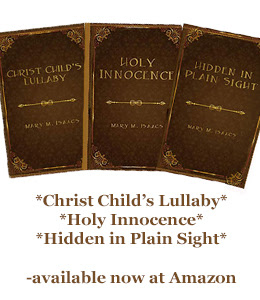Continuing our retrospective of Mary M. Isaacs' short stories...This one was published here Dec 12, 2021
Rose hurried, so she wouldn’t miss the beginning of the church service. It was already too late for her to take her place in the choir—she couldn’t have, anyway, because of the cold and laryngitis that had crept up on her the past several days. She knew it was coming and it made her heart sink. There was nothing Rose loved more than singing, and she especially looked forward to Christmas time when she could sing the beautiful music she had adored and sung since childhood. She knew she had a good voice—her friends told her that, choir directors told her that, even strangers in church said so. That didn’t matter, one way or another. She just loved to sing; she would sing even if her voice had been plain and ordinary.
She buttoned up her overcoat and put on a woolen cap, gloves, and snow boots. It was bitterly cold outside, and the forecast had called for more snow sometime before morning. Even though it was too late to protect her voice from the cold, Rose still needed to keep warm. The church was very large; good for singing but bad for warmth. As she was not going to be in the relatively sheltered group of singers standing shoulder-to-shoulder, but instead sitting in a cold wooden pew by herself, she needed the heavy outer clothing.
She remembered to turn the heat down in her small apartment. She also left a few lights on, as her parents had advised when she moved to the city. After locking the door, she hastened down the stairs and out through the glass doors of the lobby. No one was around—too cold, too late at night. Everyone was either snug at home, or already where they were going for the evening. She turned at the corner and made her way down several blocks, avoiding icy patches and leftover drifts of snow. It had been a rough week for weather, so she was careful how and where she stepped.
The bulk of the old church soon loomed on her left. She saw a few people climbing the stairs and pulling open the heavy wooden doors. She followed them, entering the quiet darkness of the narthex; there were candles burning there and also inside the sanctuary. An older man greeted her and handed her a bulletin. She looked at it as she made her way to a side aisle and seated herself at the end of a pew. The church was partly full. The service began almost as soon as she sat down…
Rose loved every moment—even the times when the choir sang alone, when she should have been singing with them. The words of their special music echoed in her heart and she imagined herself singing along. It was almost enough, but still she felt a little sad. When the congregation stood for the Christmas carols, she stood, too. After the first words of the first carol, when her voice came out as a broken whisper, she didn’t try to sing any more, but let the words and music flow around and through her. She thought the words, remembering all the years before of singing these beloved songs. Next year, next year; it will be better next year, she promised herself–next year I will sing and sing, every song! But she had a few tears. Her throat hurt and she controlled her coughing as much as possible.
In between songs and Scripture readings she looked around. The familiar church looked especially lovely in candlelight. It was so large that the ceiling was shrouded in darkness. The wood of the old, worn pews glowed in the dim light. There was a large painting on a side wall close to the front, of Mary holding the child Jesus on her lap. The light from so many candles made the image flicker a little, giving the impression of faint movement, as of breath. Mary’s eyes seemed to look right at her, sending comfort and strength, as though she knew all about Rose’s impaired voice. A wave of love came to her as she looked at the painting.
Many people sat around her. Some looked familiar, from Sunday services (although she only knew the choir members, somewhat). However, as it was the last Sunday before Christmas Eve, there were people she had never seen before—some shabby, some looking troubled or sad, others looking serene and happy. Each face held different emotions. Young and old, rich and poor, all were represented in the gathering. All had come, like Rose, to experience the hushed time of waiting and expectation.
The service came to an end and most of the people began to depart. The lights remained off as the celebrants and congregation left in candlelight. Rose noticed a few people remaining seated, in prayer or quietly waiting in the shadows.
Preparing to leave, her eyes were caught again by the painting of Mary and her son. Deep within her, she heard a silent request, a request for her to stay. Although unspoken, it was strong and compelling; Rose remained standing, facing forward, as she listened to the sweet voice inside her. After a few moments, something moved her to leave the pew and walk up the aisle toward the front of the church. Towards the painting. As she came closer, the image grew clearer and richer.
She glanced at the pews around her as she walked past. By this time they were empty, except for a few people scattered here and there. They all seemed absorbed in thought or prayer. She knew most of them slightly—there was the young woman who had shared, over coffee hour, that her husband had left her. She sat hunched over, holding her face in her hands. Farther away was the man who had been giving out the bulletins. Rose remembered that he had been laid off from his job only a week or two ago. What an awful time of year to be unemployed, she thought. She walked past an older woman who was crying silently, tears spilling down her face. Her hands were grasped together tightly. Across the aisle was an elderly couple, sitting close to each other. Rose knew they were in fragile health and were very worried about that. How did they manage to get here safely, through the icy streets? she asked herself. A young man sat quietly, with his eyes closed. Rose recognized him from past Sundays, but she was always too shy to speak to someone she didn’t know, even though he looked nice.
She finally reached the front of the church. She stopped a few feet from the painting and waited quietly, looking straight into Mary’s eyes. The voice came again…
“Sing to my Son for me.”
“But my voice is gone,” Rose whispered sadly.
“Sing to my Son for me.”
“My lady, I can’t!” tears gathered in Rose’s eyes and began to fall.
“Yes, you can. Please sing to Him.”
Rose looked down and was silent for a moment; she then raised her head, took a deep breath, and began to sing. Her heart soared, higher and higher, as she sang. It was like being lifted to the stars.
“My son, my treasured one are you,
My sweet and loving son are you,
You are my love, my darling, new–
Unworthy, I, of you.
Alleluia, alleluia, alleluia, alleluia.”
While Rose sang the old Scottish lullaby, a small part of her wondered at how she no longer had laryngitis, at how strong and clear her voice was. But mostly she was focused entirely on the song, the words, the emotions. Her grandmother had sung this lullaby to her countless times when Rose was a little girl. While she sang it, she remembered being held close in her grandmother’s arms as she slowly drifted off to sleep. It was the right song, the perfect song to sing to baby Jesus, the Christ child.
Mary’s eyes in the painting shone in the candlelight as the song words floated, high and clear, throughout the church. A sense of peace blanketed everyone there. The elderly couple looked at each other lovingly and moved closer together, clasping each other’s hands. Their worries and fears subsided as they rested in the beautiful music. The young woman whose husband had left her raised her head in surprise; a look of hope and strength slowly grew on her face.
“Your mild and gentle eyes proclaim
The loving heart with which you came–
A tender, helpless, tiny babe
With boundless gifts of grace.
Alleluia, alleluia, alleluia, alleluia.”
While the song continued, the older woman sitting alone felt a strong impulse to look at her phone. She pulled it out and then stared in near-disbelief at the number on the display. With tears blurring her vision, she quickly put on her coat and hurried toward the main door of the church. As she left, her face shone with a look of love almost matching the one on Mary’s face. The man who had passed out the bulletins stopped gathering them up, closed his eyes, and offered a prayer of thanksgiving. He knew, deep in his heart, that God was watching over him and would provide him with all he needed, every day.
“King of kings, most Holy one,
God the Son, eternal one,
You are my God—and helpless son–
High Ruler of mankind.
Alleluia, alleluia, alleluia, alleluia.”
The young man leaned over his folded hands, with a joyful smile on his face. He recognized that voice—he had heard it every Sunday, part of the choir but still distinct and set apart. That voice had touched his heart, but he couldn’t tell who the singer was. Now he knew. It was the young woman he had noticed at coffee hour. He had wanted to introduce himself to her but hadn’t quite found the right time or way. Now he looked up at the figure of the girl standing in front of the portrait of Mary and Jesus. It was like finding a long-lost friend. It had been difficult and discouraging for him, moving to an unfamiliar city without friends or family. He now felt very glad to be living here.
The lullaby ended. The last note shimmered in the air, and Rose looked into Mary’s eyes. It seemed to her that the painted smile deepened for an instant—and then the feeling of being uplifted slowly faded away and departed. Rose turned and started walking back to the pew where her coat was.
As she walked, she saw the remaining people quietly preparing to leave the church. After putting on her coat, she went to help the elderly man, who was having a little trouble bundling his wife up in her overcoat. They thanked her for her help and then all three walked to the door, Rose matching her pace to their slower steps. By the time they reached there, the church was empty. In the narthex, however, she saw the young man, who was obviously waiting for them.
“Do you have a car? It’s snowing outside,” he said to the older couple. When they answered in the negative, he asked, “May I call a taxi for you?” The couple thanked him, and the young man made the call. They waited inside until the taxi arrived, and then he and Rose helped the older couple down the church steps, which were now covered with snow. They assisted the man and his wife into the taxi, closed the door, and watched while the car pulled away from the curb and drove off.
The young man looked at Rose. “How are you getting home? Do you need a taxi, too?”
She answered, “Oh, no, I live only a couple of blocks from here. It’s just a short walk.”
“But it’s a cold and slippery walk,” he responded. “May I see you home? I wouldn’t want you to fall and hurt yourself.”
Rose looked at him for a moment, and then smiled. He was a stranger—but also not a stranger. She had seen him in church, often, and he had helped the old couple. She wasn’t quite sure why, but she trusted him. “Thank you. I live down that way,” she said, pointing. “Oh–my name is Rose.”
“I’m Joe,” the young man said, and he held out his elbow for her. She put her arm through it and they walked off together, slowly and carefully, avoiding icy patches and the fresh drifts of snow.
~~~~~~~~~~~~~~~~~~
Note: “The Christ Child’s Lullaby” is an English translation of a much longer traditional Gaelic Christmas song, “Taladh Chriosda,” from the Outer Hebrides of Scotland.
(copyright 2018, Mary M. Isaacs)









No comments:
Post a Comment